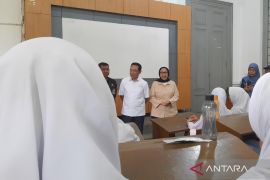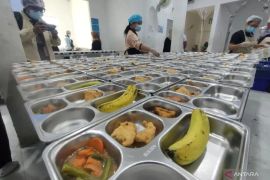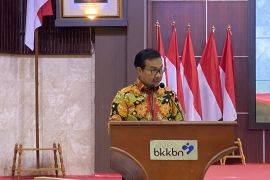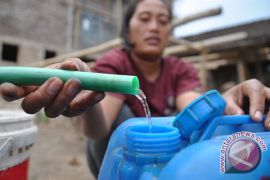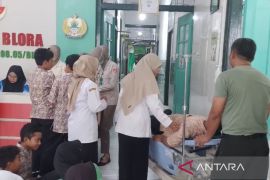Lack of sanitation facilities and poor awareness of proper management of domestic waste-water, and the discharge of untreated waste into water systems is one of the most common sanitation problems in Indonesia.
"Indonesia is one of many countries around the world with sanitation problem that causes many types of disease and death,"
environment office director of the U.S. Agency for International Development (AUSAID) Indonesia, Alfred Nakatsuma, said in Jakarta on Monday.
Nakatsuma said about one billion people around the world
ares still without toilets and 81 percent of whom happened in India, Indonesia, China, Ethiopia, Pakistan, Nigeria, Sudan, Nepal, Brazil, Niger, and Bangladesh.
"Therefore, water construction and sanitation require government planning and public support. In addition, the people have to be able to make changes for themselves and their environment," he noted.
He pointed out that 94 percent of diarrhea epidemic was caused by bad sanitation and consumption of contaminated water.
Contaminating the water sources also has an indirect affect on health by exposing foods, such as vegetables and fish, to the pathogens present in contaminated water.
According to him, contaminated wells are another sanitation problem in Indonesia.
In areas that rely on hand dug wells, the typically shallow depth of the wells often allows for contamination from the groundwater.
Overcrowded living conditions and the improper disposal of waste can also contribute to contaminated groundwater.
Nakatsuma said USAID has announced a new activity called the USAID Indonesia Urban Water, Sanitation and Hygiene (USAID IUWASH) Project to build on over 10 years of collaborative assistance with the government of Indonesia in safe water and sanitation.
IUWASH is a five-year, US$33.7 million effort that will expand access to water and sanitation services to Indonesia?s urban poor, currently those people with the most limited access to these services.
The project will promote the goals of the U.S.-Indonesia Comprehensive Partnership by improving urban water and sanitation services thereby strengthening individual health.
The Comprehensive Partnership advances cooperation in a wide range of issues to sustain the environment, promote prosperity, strengthen democracy, enhance understanding and ensure security.
He said the IUWASH project would also contribute to achieving safe water and sanitation targets that the Government of Indonesia has set as part of their United Nations Millennium Development Goals.
Meanwhile, Public Housing Ministry`s bureau chief of planning and budgeting, Oswar Mungkasa, said diarrhea could occur when the stomach was infected by microbes from faeces.
"Besides diarrhea, other diseases such as typhoid fever, hepatitis-A, and polio, are still haunting the people with unhealthy behaviors," Mungkasa said.
Therefore he noted that solution to sanitation program should be on top of both government and public priority.
The World Health Organization (WHO) reports that problems associated with sanitation result in four percent of all deaths, and nearly six percent of all illnesses worldwide.
Sanitation problems are particularly difficult for people with impaired immunity, the elderly, and the very young, and understanding sanitation problems is an important step in eliminating them.
In an effort to work together to increase access to clean water and sanitation across Indonesia, U.S. Embassy and Indonesian Government counterparts held a round-table discussion about sanitation month in Jakarta, including Global Hand-washing Day on October 15, 2011.
In a U.S. Embassy press statement, USAID Mission Director Glenn Anders said the USAID Indonesia Urban Water, Sanitation and Hygiene (IUWASH) project would continue working with the Government of Indonesia to increase access to safe water for two million people and provide sanitation for 200,000 people.
He said the project would reach poor populations in urban areas, and address the challenges water utilities face in ensuring water access and availability, such as climate change and increasing water demand in urban areas.
"With strong national government leadership and the full support of local governments, it is evident that Indonesia`s efforts are beginning to produce results. The role of local governments will be particularly critical if we are finally to declare victory in these efforts," Glenn Anders explained.
He said water and sanitation are basic needs that have lasting impact on issues of economic growth and the achievement of national development performance targets.
"Unfortunately, clean water and access to sanitation facilities are still a challenge in Indonesia," he said.
As of 2009, only 47 percent of Indonesian population had access to safe drinking water.
Basic sanitation facilities reached only 51 percent of Indonesians.
The 2015 Millennium Development Goals are ambitious: providing drinking water services to nearly 60 million Indonesians and sanitation services to 35 million.
The United States, in partnership with the Government of Indonesia, will continue increasing support to access to water and sanitation in Indonesia.(*)
O001/H-NG
Reporter: Otniel Tamindael
Editor: Jafar M Sidik
Copyright © ANTARA 2011
